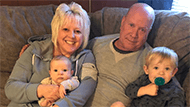Cindy Cook – Rectal Cancer Patient Story

In March 2017, Cindy Cook noticed her bowel movements had changed – the shape changed, she felt like she could never fully empty, and she always had the urge to go. The 47-year-old chalked it up to the effects of her new diet and exercising.
Cindy divulged her symptoms to her hairdresser, who she knew had diverticulitis. Her stylist urged her to see a doctor. After many months, Cindy visited her primary care doctor who had her tested for celiac disease, an autoimmune disorder where ingesting gluten leads to damage in the small intestine. The results were questionable, says Cindy.
Her doctor referred her to a specialist to have a colonoscopy done. Yet, Cindy kept cancelling appointments.
Meanwhile, Cindy’s symptoms didn’t change. Several months later, again at the urging of her hairdresser, she made an appointment to see a general surgeon in Dubois, Pa. – an hour drive from her home in Emporium. She finally had a colonoscopy in December.
“It was the easiest thing I ever did,” says Cindy.
However, her doctor found a tumor that was 4.9 centimeters (cm) and recommended Cindy to the best doctor they knew: David Medich, MD, a colon and rectal surgeon at UPMC Hillman Cancer Center who specializes in managing colon and rectal carcinoma.
Expert Cancer Care
Dr. Medich saw Cindy fairly soon after at UPMC Passavant–McCandless, a three-hour drive from her home.
Although a CT scan revealed her rectal cancer hadn’t spread, Dr. Medich recommended she undergo chemotherapy and radiation therapy to shrink her tumor before having surgery to remove it.
“I would trust my life with Dr. Medich. He was so caring and loving,” says Cindy. “He was also direct and said, ‘This what we're doing.’ But, at the same time, he was right there to hug me.”
Cindy turned to religion shortly after her diagnosis. “I went back to church, ran to God, and I haven’t turned away since. My faith really got me through this,” she says. “I was so scared I would die. My husband and my family mean the world to me. I didn’t want to miss my daughter’s wedding or not be able to enjoy my grandchildren.”
Cindy started treatment in DuBois in 2018. She completed 28 radiation treatments then six weeks later, had five chemotherapy sessions. She responded well to the treatment; a PET scan showed her tumor shrunk to 1.7 cm.
Advanced Surgical Techniques
On July 5, Cindy underwent a surgical procedure at UPMC Passavant–McCandless to have part of her rectum and 22 lymph nodes removed. To replace her rectum, Dr. Medich needed to create a J-pouch made from her large intestine. Cindy also required an ileostomy for three months while her J-pouch healed. The ileostomy allowed waste to pass through to an external collection system.
Following her recovery, Cindy returned to the hospital three months later to have the ileostomy reversed. Upon being discharged, she received good news.
“Dr. Medich told me I had gone from stage three to stage one since my treatment, and that I was now cancer free,” says Cindy.
A colonoscopy one year later showed promising results, followed by a successful colonoscopy three years after that. Annual CT scans also came back normal.
Cindy says the staff helped her get through the many procedures. “You feel almost embarrassed and mortified over the exams and colonoscopies,” she says. “One nurse shared her story about her cancer journey, and it made me feel understood. I would never go anywhere other than UPMC.”
The Importance of Colorectal Screening
Moving forward, Cindy will undergo a colonoscopy every three years.
“There isn’t a day I wake up where I don't say thank you for this day because I am very lucky,” she says. “By the grace of God, I'm here with my family.”
Cindy, now 53, said she wishes she would have listened and had her first colonoscopy sooner.
“I am so vigilant about telling people to take care of their bodies because I should have, and I didn't. And I probably could have saved myself a lot of what happened,” she says.
Cindy persuaded her husband to have his first colonoscopy, which showed he had a precancerous polyp.
“If your body's giving you a sign, listen to it because it could cost you your life,” she adds. “It's that simple.”
 UPMC
UPMC
 UPMC Children's Hospital of Pittsburgh
UPMC Children's Hospital of Pittsburgh
 UPMC Magee-Womens Hospital
UPMC Magee-Womens Hospital
 UPMC Immune Transplant and Therapy Center
UPMC Immune Transplant and Therapy Center

